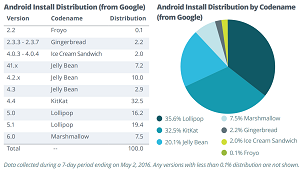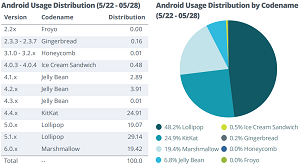News
Report: 'Android Is No Longer Fragmented' (That Much, Anyway)
- By David Ramel
- June 17, 2016
The many Android OS versions in use -- often cited as an impediment to mobile developers targeting the iOS rival platform -- isn't actually that bad anymore, says a new research report that indicates coders should mostly concern themselves with the KitKat, Lollipop and Marshmallow releases.
Mobile app analytics company Apteligent Inc. reached that conclusion in its new monthly data report, this one focusing on the Android ecosystem in view of the recent Google I/O conference.
"Android is no longer fragmented," said Apteligent in a news release today announcing its new data. "This report was designed to provide insight into the Android ecosystem specifically," said Andrew Levy, CSO and co-founder of Apteligent. "Android isn't as fragmented as once was believed. In fact, its operating system distribution is now similar to iOS. This insight can be helpful to developers and product managers as they continue to create mobile apps, but it's even more helpful for organizations because the analysis of their current apps will help to make future business decisions."
The research dives into the details behind Levy's analysis. "Android is not fragmented," states a subhead in the report, despite statistics from Google that seem to back up the oft-cited fragmentation problem. Apteligent said its data, culled from tens of thousands of devices, reveals a different take on the situation.
"One of the major criticisms of Android is the fragmentation of its operating system versions," the report says. "Releasing an Android update involves lengthy approval processes and coordination between Google, carriers and OEMs. Google in particular has been investing a lot of time and effort to reducing this approval time. They've also taken steps to work around the system by pushing updates through Google Play Services."
Apteligent says that Google's statistics, presented in the following graphic, have some problems.
 [Click on image for larger view.]
Google's Android OS Stats (source: Google, via Apteligent)
[Click on image for larger view.]
Google's Android OS Stats (source: Google, via Apteligent)
"First, it only takes into account phones running Google Play, so a significant set of data is missing from users in countries like China," Apteligent said. "Second, and most importantly, it does not take into account usage." With those factors in mind, the company provided its own take on the issue based on usage of the OSes for a week last month:
 [Click on image for larger view.]
Apteligent's Take on Its Comparative Data (source: Apteligent)
[Click on image for larger view.]
Apteligent's Take on Its Comparative Data (source: Apteligent)
Based on its data, Apteligent said there are only three Android OSes that matter: KitKat, Lollipop and Marshmallow.
"App owners typically focus on the operating systems that are most widely used by their customer base," the report said. "For these decision makers, the official Google dataset and resulting analysis (which represents a snapshot of market share) falls short of being actionable. Apteligent's actual usage data shows that 93 percent of all Android traffic comes from just three operating systems: KitKat, Lollipop, and Marshmallow. Contrast this to iOS where there are only two operating systems that matter: iOS 8 and iOS 9. These two OS versions comprise 97 percent of iOS traffic."
The report also examines Apple TV usage vs. Android TV and compares how fast different device manufacturers provide Android OS updates to their customers.
About the Author
David Ramel is an editor and writer at Converge 360.